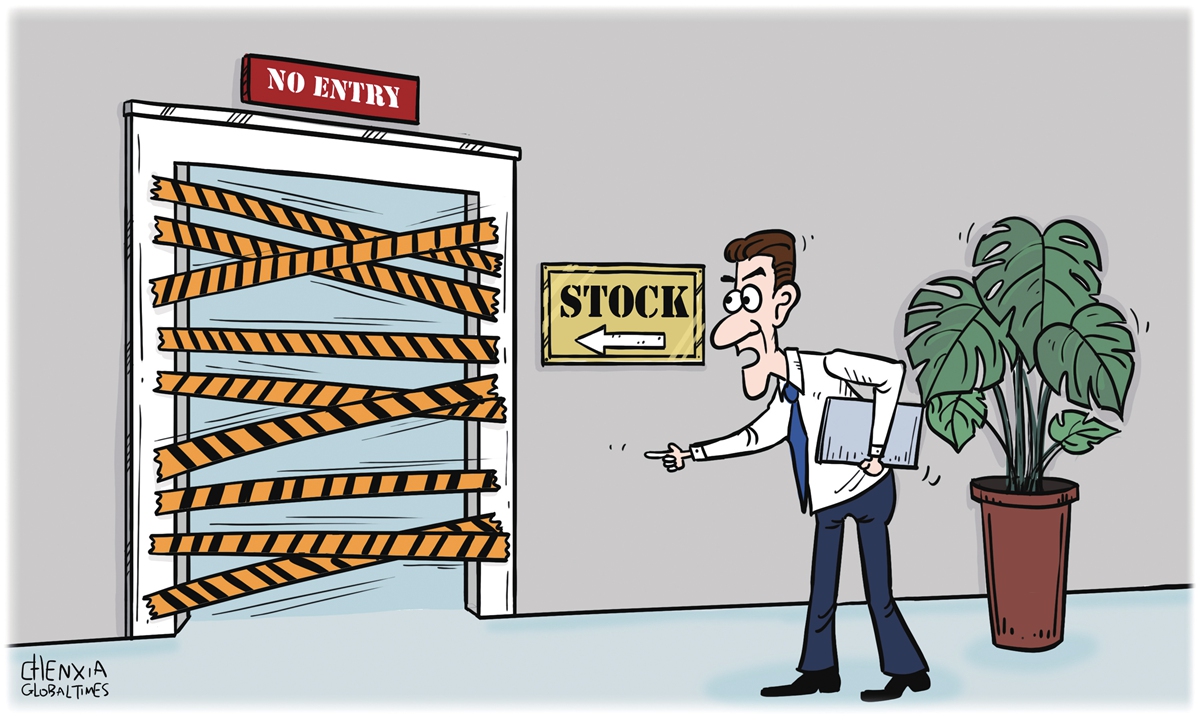
Illustration: Chen Xia/Global Times
US media outlet New York Post reported Sunday Georgia Democratic freshman Senator Jon Ossoff is looking to introduce a bill that would ban Congressmen and their families from trading individual stocks.
It's somewhat absurd for a lawmaker in the US, a liberal capitalist country, to advocate restricting the freedom of engaging in stock trades. The essence of US society is that the rich and powerful take it all, and freedom in the country is only for those people. Thus, the political system doesn't actually endorse freedom and democracy. It is a political system that allows the dominant ones to do whatever they want, while the weaker ones have to suffer from social injustice.
There have already been several similar bills before, including the Ban Conflicted Trading Act introduced in March to prohibit trading by Congressmen and their senior staff. Back in 2012, the Stop Trading on Congressional Knowledge (STOCK) Act was passed under the Obama administration to restrict members and employees of Congress from "using nonpublic information derived from their official positions for personal benefit, and for other purposes."
However, the US media outlet Business Insider recently found that 52 Congressmen and 182 senior-level congressional staffers have violated the STOCK Act. "Numerous members of Congress, both liberal and conservative, are united in their demonstrated indifference toward a law designed to quash corruption and curb conflicts-of-interest," the report reads.
It is not rare for US senators and representatives to use their power for economic benefit. This is a typical act of corrupt politicians interfering with the normal market operation and misusing national resources. And since many US lawmakers are the ones breaking the law, this might lead to the public's lack of confidence and dissatisfaction with US politics and the constitutional system.
The bill to be proposed by Ossoff highlights the extremely bad image of some Congressmen who take advantage of the loopholes in the US' imperfect system and their positions for personal gains.
This includes US House Speaker Nancy Pelosi, one of the wealthiest US lawmakers. It is reported that Pelosi's husband has "raked in" millions of dollars trading shares of tech companies. Pelosi herself publicly defended stock trading by lawmakers in December, claiming that the US is "a free-market economy" and Congressmen "should be able to participate in that."
One of the key parts in the process of improving the US political system is indeed finding a way to stop lawmakers from using their information or other privileges for their own and their families' benefits. Ossoff's proposal is a wake-up call for Congressmen to better focus on serving the public interest. However, for now, the process of making Ossoff's potential bill into reality seems to be riddled with obstacles.
For one, Ossoff has said he plans to introduce the bill once he finds a Republican co-sponsor. But so far, no Senate Republicans appear to have publicly come out against congressional stock trades, according to the New York Post report.
Besides, it is hard for the bill to thrive and perform its original function under the toxic US system. US politics is highly divided and all the issues are politicized. This means any bill proposed by Democrats, no matter how well-intentioned, will be politicized and opposed by Republicans.
Is it possible to change the toxic system when the politicians in key positions are not "clean" themselves? For them, to promote projects or bills that improve social justice means to be morally crucified by the general public. This is obviously against their will.
Ossoff's idea to ban individual stock trades in Congress conforms to the interests of the general public. But with a great number of Senators being corrupt, the bill to be introduced by Ossoff will not be passed smoothly. That is because when the issue is raised in the Senate, it will only become a question of whether the bill is in the political and personal interests of certain parties or politicians.
It is still quite uncertain what ending this bill will face. Even if it ends as Ossoff desires, the bill will be enacted under the fierce partisan struggles in the US Congress. The current US political machine is operating abnormally.
The author is a professor at the Institute of International Relations of the China Foreign Affairs University. opinion@globaltimes.com.cn

